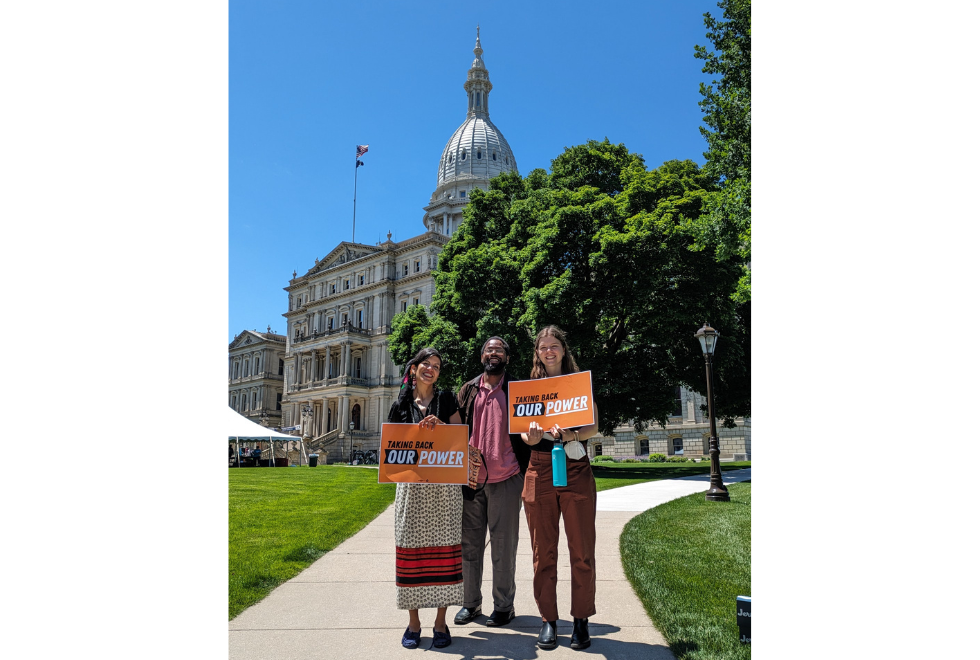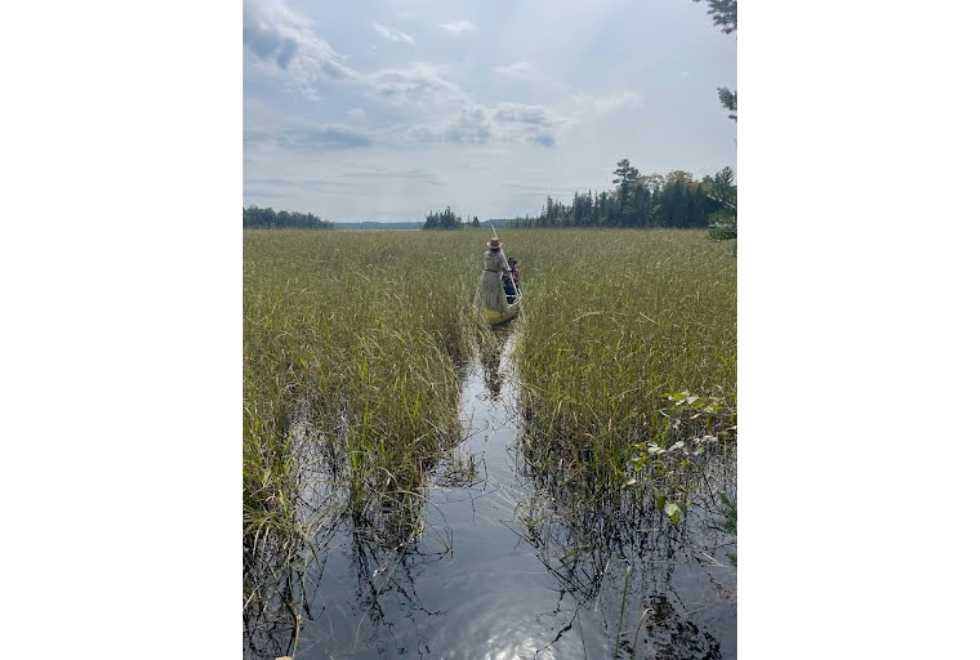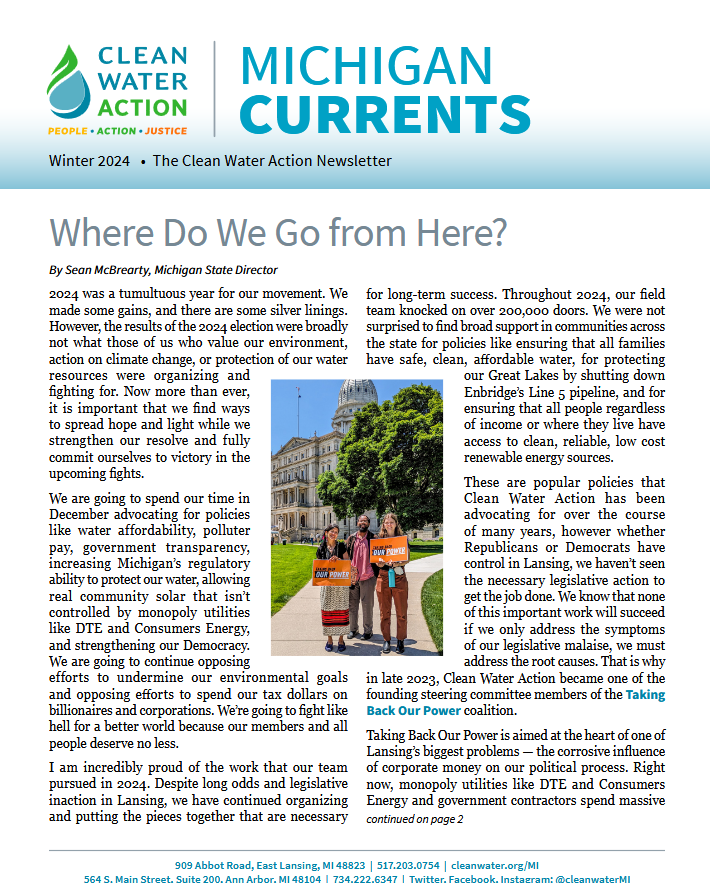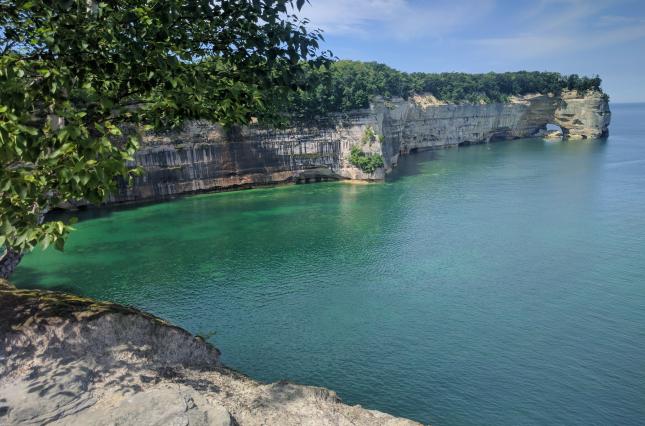In This Issue:
By Sean McBrearty, Michigan State Director
2024 was a tumultuous year for our movement. We made some gains, and there are some silver linings. However, the results of the 2024 election were broadly not what those of us who value our environment, action on climate change, or protection of our water resources were organizing and fighting for. Now more than ever, it is important that we find ways to spread hope and light while we strengthen our resolve and fully commit ourselves to victory in the upcoming fights.
We are going to spend our time in December advocating for policies like water affordability, polluter pay, government transparency, increasing Michigan’s regulatory ability to protect our water, allowing real community solar that isn’t controlled by monopoly utilities like DTE and Consumers Energy, and strengthening our Democracy. We are going to continue opposing efforts to undermine our environmental goals and opposing efforts to spend our tax dollars on billionaires and corporations. We’re going to fight like hell for a better world because our members and all people deserve no less.
I am incredibly proud of the work that our team pursued in 2024. Despite long odds and legislative inaction in Lansing, we have continued organizing and putting the pieces together that are necessary for long-term success. Throughout 2024, our field team knocked on over 200,000 doors. We were not surprised to find broad support in communities across the state for policies like ensuring that all families have safe, clean, affordable water, for protecting our Great Lakes by shutting down Enbridge’s Line 5 pipeline, and for ensuring that all people regardless of income or where they live have access to clean, reliable, low cost renewable energy sources.
These are broadly popular policies that Clean Water Action has been advocating for over the course of many years, however whether Republicans or Democrats have control in Lansing, we haven’t seen the necessary legislative action to get the job done. We know that none of this important work will succeed if we only address the symptoms of our legislative malaise, we must address the root causes. That is why in late 2023, Clean Water Action became one of the founding steering committee members of the Taking Back Our Power coalition.
Taking Back Our Power is aimed at the heart of one of Lansing’s biggest problems - the corrosive influence of corporate money on our political process. Right now, monopoly utilities like DTE and Consumers Energy and government contractors spend massive amounts of money on legislative lobbying and on our elections. Meanwhile, Michigan ratepayers pay some of the highest energy rates in the Midwest while suffering through the most and longest power outages in the region. In Lansing it is cheaper for these utilities to spend money playing politics and avoiding accountability than it is for them to invest in providing cleaner, more reliable, and cheaper energy to their ratepayers.
We are seeking to ban all regulated utilities and all government contractors with contracts worth more than $250,000 from making political contributions. Throughout 2025 and 2026, this will be one of our biggest fights. When we win, it is likely to bring about a watershed moment in enacting popular policies that help real people, not corporations. Similar policies have been enacted in other states, and strong ethics rules like this have already been upheld in federal court.
We won’t win every one of these battles, but we are choosing important fights for the future of our movement and simply engaging in these struggles moves the ball forward. In times like these, help from supporters like you really makes a difference and sustains us in the fight. In times of tribulation and conflict, times where we face long odds like today, I often think of John Steinbeck’s words for organizers of the 1930s, “fear the time when the strikes stop while the great owners live - for every little beaten strike is proof that the step is being taken”.
With so much moving forward and so many important fights coming up, we need your help today more than ever. Together we will walk the path ahead and prove that a grassroots struggle that builds power from the bottom up is essential to making progress on the issues that matter most. As we prepare for 2025 and the critical fights ahead, I take courage in knowing that we can count on your support, and I’m thankful to be in this fight with you.
Now is the time to make a difference for our water. Our Great Lakes are counting on you to respond.

Learn more and take action at cleanwater.org/TBOP
The Powerful Commitment Of Thanksgiving
By Nichole Keway Biber, Mid-Michigan Campaign Organizer
Reflecting on the American Thanksgiving holiday, many may experience internal and external conflicts regarding perceptions about gratitude, togetherness, and the history behind the fourth Thursday in November. Do the realities of displacement and damage, discord and strife, render this holiday into a hollow charade, or even a harmful fiction? Is it possible for the complications and complexities of our relationships to food, family, community, and our nation to be received in a manner that will nourish connections?
As in all cultures, among the Anishinaabek (Great Lakes Indigenous) people, ancestral traditions largely revolve around food security and sovereignty. I have learned that there are stories and teachings connected to all foods, whether traditional or contemporary. From the Whitefish clan who sacrificed their own lives in an age-old treaty to ensure the survival of all Anishinaabe just so long as we respect and protect the waters that are their home, to the continued presence of fry bread at celebratory gatherings. Though we know fry bread is the unhealthy by-product of government rations that marked the complete loss of our food sovereignty, it also symbolizes the unquenched determination to give each other the very best we could despite even the most catastrophic circumstances. Alongside struggles that cannot be ignored, there remains the necessity of showing love.
In this sense, the act of eating means we are literally imbibing history, from pre-contact to the present. If the baseline of consciousness and expression rests in experiential, shared reality, what and with whom we eat is indeed a universal variant of life on Earth. Because central to traditional patterns of life and travel, food is ingrained in Anishinaabe stories that guide morality, alongside best practices for planting, hunting, harvesting, and cooking. Parcel to the achievement of Minobimaadziwin (the good life), these guiding stories invariably focus upon the central tension between gratitude and greed. It cannot be overstated how consequential this struggle is to Anishinaabe instructions, as illustrated by the example of the Wiindigo - an insatiable monster of greed that grows ever larger and hungrier in proportion to its excess. This compulsive consumption also causes the Wiindigo to become ever more emaciated in body and in the capacity of the heart, resulting in a tortured state of ceaseless spiritual withering and alienation.
I cannot help but link the cautionary tales of the Windigo to the broken parts of our current food system, as it subsidizes profit at the expense of security, sovereignty, stewardship, and respect. The industrialized, extractive model of Big Agriculture’s industrial monopolies impoverishes small, legacy farmers; poisons water; abuses animals; destroys topsoil; and altogether operates in a manner that is inextricable from alienation. As we observe how this greed-driven alienation from good food intertwines with the removal of Indigenous people from homelands (here and in Africa), in the waves of displaced small farmers, in the loss of fertile soil and drinkable water, what is the proper and necessary response? This is where the immense potential of Thanksgiving resides, should we orient ourselves to embracing the word as a practice and commitment.
We can begin by extracting ourselves from a market-driven, mistaken sense of what is “convenient,” to instead consider what is worthwhile. Smaller scale, localized farming; keeping home and school and community gardens; envisioning our relationship to cooking as a way to show necessary care - none of these come with the seeming ease of mechanization, but all can replenish spirits burdened by alienation. Though currently shackled to an exploitative system, we are the ones whose actions ultimately determine the way our lives are composed. We can claim our ability to take care together, as a priority and a daily given task that begins with gratitude as the antidote to greed.
I am grateful for the Thanksgiving meal marking the bountiful harvests of these lands. I give thanks for the resurgence of Manoomin camps, for seed savers, for gardens, for the animals who gave their lives in the hunt and those whom we must ask for forgiveness and liberation from the cruelties of brutal industry. Much gratitude to all environmental activists and truth tellers who push back against a system that favors the corporate bottom line at the expense of the basics of survival. We need water, we need soil, we need insects, we need diverse seeds, we need to grow and cook and gather together. Let us be gratefully, humbly, lovingly dependent upon this living Earth. The polluters for profit can’t stop all of us at once. Should we choose to heal people, water, plants, and animals in the places we are, food provides the most intimate measure of health. Thanksgiving can be a powerful action, committed to food sovereignty, and nourished by love.

The author and her daughter harvesting manoomin (wild rice)
2024 Election Results and Our Work
We’re proud of our work to motivate clean water voters in the recent elections. See our state updates in this issue. The impact of the election on our national level work will, unfortunately, be dramatic. The new administration has committed to gutting federal agencies, rolling back health and environmental protections, and to taking us backwards on addressing the climate crisis. Among its priorities are further weakening the Clean Water Act’s stream and wetlands protections, despite the devastation already caused by the U.S. Supreme Court’s decision in Sackett v. EPA. Both the U.S. House of Representatives and the U.S. Senate will be controlled by a party now seemingly hostile to strengthening environmental and health protections. Many members are committed to extreme federal budget cuts. We know that despite this rather dire reality, people’s voices matter and our work can make a difference. We will be working to oppose anti-regulatory initiatives, to protect the clean water and clean air protections that the public supports, and to stand up for effective government that implements our landmark environmental laws to make people and our communities healthier.
The Safe Drinking Water Act: 50 Years of Progress — But the Work is Never Finished
The Safe Drinking Water Act (SDWA) was signed into law by President Gerald Ford on December 16, 1974. The goal of the nation’s first comprehensive drinking water law was to reduce risks to public health from drinking water. The law ushered in remarkable improvements and technical innovation in drinking water treatment and distribution. Still, the task is never complete. Clean Water’s work around drinking water is focused on ensuring that we maintain the collective commitment to ensuring safe drinking water for all. Priority issues include:
- Making sure SDWA’s contaminant limits keep up with health science around long-known contaminants like nitrates and arsenic and that regulations address “emerging” contaminants like microplastics
- Ensuring ongoing federal water infrastructure investments to support local drinking water system improvements and robust budgets for federal and state agency implementation of the law
- Elevating the need to keep pollutants out of our drinking water systems in the first place so that drinking water systems and their customers don’t bear all the costs of removing contaminants like the notorious PFAS chemicals
A Win for Our Water: Progress On Getting Lead Out Of Drinking Water
On October 8, the U.S. Environmental Protection Agency (EPA) finalized the Lead and Copper Rule Improvements, regulations which require full replacement of lead service lines in drinking water systems. Putting lead service lines behind us has been a goal of Clean Water’s work.
The vast majority of lead service lines, which bring water from the large water main into the home or building, will be replaced within ten years of the new regulation’s implementation. The effort is supported by targeted funding from the Bipartisan Infrastructure Investment and Jobs Act, including $2.6 billion in funding announced in October. “Because of lead’s health impacts on children and adults, even at low levels, it is critical to reduce lead exposure wherever we can. We welcome the Biden-Harris administration and EPA’s bold action. We can get lead out of drinking water and redouble efforts to eliminate lead exposure from paint, food, and other sources,” National Campaigns Director Lynn Thorp said in our press release heralding the announcement.
Thank you for supporting our work in Michigan.
CURRENTS is published by Clean Water Action and Clean Water Fund.
Reproduction in whole or part is permitted with proper credit. © 2024 All rights reserved.


